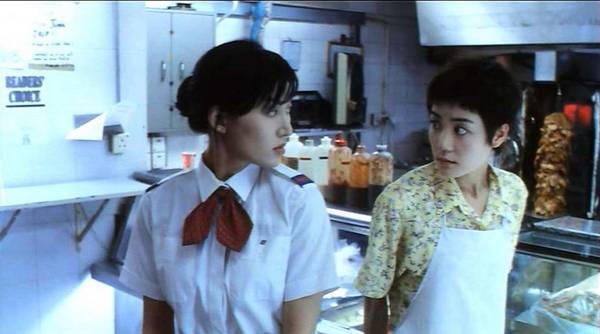Chungking Express at the Center of the World

The tale told in Wong Kar-Wai’s 1994 film Chungking Express isn’t particularly straightforward. In between the stop-motion jumps and alternative shots, the flick tells two stories: a cop with a jones for a lost love buys tins of pineapple that are due to expire the same day as his affection, while another cop. . . . Well, there’s some mirroring with postdated boarding passes and a girl named Faye and California, the restaurant and the place and that kind of Dreamin’ from the Mamas and the Papas song, and . . . uh, flight attendants and cousins . . . and. . . . Suffice to say it’s perfectly complicated. The title of the film in Chinese literally translates to “Chungking Jungle,” which refers to both its dense urban landscape and the Chungking Mansions in Tsim Sha Tsui, Kowloon, Hong Kong, where much of the movie’s first sequence is set. Like the film, the Chungking Mansions offer an idiosyncratic slice of life in our transnational capitalist society.
Curry shops, African record stands, clothing stalls, sari tailors, Nigerian exporters, Sub-Saharan internet cafes, Lahore Fast Food, barbershops, Bollywood video kiosks, guestrooms inhabited by 120 distinct nationalities (on any given day), porno stands, and even Indian whiskey distributors fight for turf among a 17-story tower block. But as a recent Wall Street Journal review of anthropologist Gordon Mathew’s Ghetto at the Center of the World: Chungking Mansions, Hong Kong points out, the notoriously shabby tenement is engaged in a culture as much about low-end globalism as it is about cheap sleep and squalid stories.
Visitors go to Chungking Mansions to buy consumer and trade goods that have been manufactured in mainland China, bringing them back to their home countries for resale at a higher price. The goods are bought from middlemen who work from one of the more than 100 tiny storefronts and stalls on the lower floors of the building. Some traders transport their goods home by pooling money and renting shipping containers, but many simply fill their luggage with wares.
In the production notes for Chungking Express, Kar-Wai speaks to his desire to use the Mansions as part of his set:
It is a legendary place where the relations between people are very complicated. It has always fascinated and intrigued me. It is also a permanent hotspot for the cops in Hong Kong because of the illegal traffic that takes place there. That mass-populated and hyperactive place is a great metaphor for the town herself.
The WSJ goes on to commend Ghetto at the Center of the World as “a first rate business book,” and closes its review with a quote that further articulates the Mansions as a microcosm of capitalism’s soft underbelly:
Mathews adds: “As a Pakistani said to me vis-à-vis Indians, ‘I do not like them; they are not my friends. But I am here to make money, as they are here to make money. We cannot afford to fight.'”
Whither the West? You’ll have to watch the movie to find out whether or not the cop(s) get(s) the girl(s).
